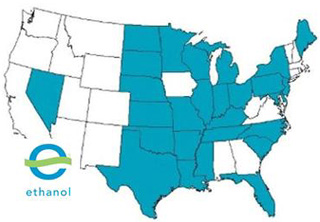 The Ethanol Promotion and Information Council (EPIC) state branding program has added another three states to the list of those that have approved the “e” label for ethanol at the pump.
The Ethanol Promotion and Information Council (EPIC) state branding program has added another three states to the list of those that have approved the “e” label for ethanol at the pump.
Maine, Mississippi and Wisconsin are the latest to approve the pump label, a project EPIC has been working on for just about a year now. The map shows all of the states that have approved the label so far. The idea is to have a recognizable symbol to identify ethanol blended fuel no matter where a motorist fills up.
It may seem odd that Iowa is one of the state not marked yet, but as EPIC Acting Executive Director Robert White explains, “Iowa is one of the states that has a set label that they use and we are working with our partners, the Iowa Corn Growers Association, to revisit that label.” White says that the Iowa Department of Agriculture wants to have consistency for consumers in the labeling of ethanol from state to state and since they are literally surrounded by states which have now adopted the “e” logo, he is confident that Iowa will soon approve it as well.
The approval means that the state has “given its blessing” for the logo to be used to identify ethanol blends at the pump. It is then up to grassroots efforts within each state to get retailers to use the labels.


 The
The  Binghamton, NY-based Alternative Fuels, Inc. is looking at putting a biodiesel plant in Northeast Pennsylvania after the state has come up a $1 million grant to help the refiner make biodiesel out of algae.
Binghamton, NY-based Alternative Fuels, Inc. is looking at putting a biodiesel plant in Northeast Pennsylvania after the state has come up a $1 million grant to help the refiner make biodiesel out of algae. Smith has until the end of the year to get his production facility up and running in order to receive the state funding. The “Moving to Pennsylvania” notice on his company’s Web site and a published report Tuesday in the Binghamton Press & Sun Bulletin that Smith is selling his biodiesel plant there could be indications he’s serious about meeting the deadline.
Smith has until the end of the year to get his production facility up and running in order to receive the state funding. The “Moving to Pennsylvania” notice on his company’s Web site and a published report Tuesday in the Binghamton Press & Sun Bulletin that Smith is selling his biodiesel plant there could be indications he’s serious about meeting the deadline. The agenda has been set for the Washington International Renewable Energy Conference, or
The agenda has been set for the Washington International Renewable Energy Conference, or  Missouri Governor Matt Blunt is serious about making the Show Me State a renewable fuels leader.
Missouri Governor Matt Blunt is serious about making the Show Me State a renewable fuels leader. New York City area online grocery delivery service FreshDirect is switching its delivery trucks to biodiesel.
New York City area online grocery delivery service FreshDirect is switching its delivery trucks to biodiesel. The gourmet food deliverer says it will get its fuel from locally-based Tri-State Biodiesel. According to
The gourmet food deliverer says it will get its fuel from locally-based Tri-State Biodiesel. According to 


 A new poll shows that three-quarters of Kansans who were surveyed prefer the expanded use of wind energy, as opposed to more conventional coal-fired power plants.
A new poll shows that three-quarters of Kansans who were surveyed prefer the expanded use of wind energy, as opposed to more conventional coal-fired power plants.